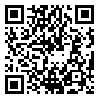Volume 30, Issue 3 (Summer 2022)
Avicenna J Nurs Midwifery Care 2022, 30(3): 181-190 |
Back to browse issues page
Ethics code: IR.IAU.KHUISF.REC.1398.236
Download citation:
BibTeX | RIS | EndNote | Medlars | ProCite | Reference Manager | RefWorks
Send citation to:



BibTeX | RIS | EndNote | Medlars | ProCite | Reference Manager | RefWorks
Send citation to:
Fallah M, Barkhordari-Sharifabad M, Nasiriani K. Effect of Mindfulness-Based Self-Care Education on the Quality of Female Nurses’ Life. Avicenna J Nurs Midwifery Care 2022; 30 (3) :181-190
URL: http://nmj.umsha.ac.ir/article-1-2442-en.html
URL: http://nmj.umsha.ac.ir/article-1-2442-en.html
1- Department of Nursing, School of Medical Sciences, Yazd Branch, Islamic Azad University, Yazd, Iran
2- Department of Nursing, School of Medical Sciences, Yazd Branch, Islamic Azad University, Yazd, Iran ,barkhordary.m@gmail.com
3- Department of Nursing, Nursing and Midwifery Research Center, Research Centre for Neonate and Mother, Shahid Sadoughi University of Medical Sciences, Yazd, Iran
2- Department of Nursing, School of Medical Sciences, Yazd Branch, Islamic Azad University, Yazd, Iran ,
3- Department of Nursing, Nursing and Midwifery Research Center, Research Centre for Neonate and Mother, Shahid Sadoughi University of Medical Sciences, Yazd, Iran
Persian Full-Text [PDF 1205 kb]
(1452 Downloads)
| Abstract (HTML) (3337 Views)
Extended Abstract: (1463 Views)
Background and Objective
Quality of life is a multi-dimensional concept that is influenced by numerous important factors, such as physical and psychological conditions, individual opinions, and social connections. It is important to evaluate the quality of life of nurses since they deal with human lives; as a result, they can provide more effective services. Self-care is the first step toward health and is a science in which each person uses his knowledge, skills, and ability as a resource to independently take care of his health. Here, independently means making decisions about oneself or relying on oneself. In recent decades, the application of mindfulness-based interventions has increased. These interventions teach mindfulness skills to promote psychological health and well-being. Due to the inevitability of some factors in the nursing profession, such as mental distress and job stress, owing to the nature of the nursing profession, it is among the duties of health care service organizations to prevent psychological and behavioral effects to improve the quality of life. Therefore, this study was conducted to investigate the effect of mindfulness-based self-care education on the quality of female nurses' life.
Materials and Methods
This experimental study was conducted in 2019. The sample size was determined 30 individuals in each group. Initially, a list of eligible nurses was prepared from the nursing office, and a number was assigned to each of the nurses. Afterward, the samples were randomly placed in either control or experimental group using a table of random numbers. The inclusion criteria were being willing to participate in research, having work experience of at least 2 years, having the ability to attend all training sessions without being absent, and not having received any other training programs before and during the mindfulness intervention. On the other hand, the nurses who were on leave for more than a month, were working part-time, were under treatment with psychiatry medicines, and had a history of participating in similar programs were excluded from the study. Both groups completed the demographic form and the World Health Organization’s Quality of Life questionnaire before the intervention. Subsequently, for the experimental group, mindfulness-based self-care was taught in eight two-hour sessions weekly. Immediately after the end of the intervention, the questionnaires were completed once more by both groups. The collected data were analyzed in SPSS software (version 19), and the significance level was considered at 0.05.
Results
The results showed that at the beginning of the study, the mean scores of the quality of life of nurses in the experimental and control group were 64.58±11.41 and 69.58±13.00, respectively, which according to the mean score of 50, they were in a medium-to-high level. An Independent t-test was used to compare the two groups with each other. Based on the results, in the post-test phase, there was a significant difference only in the psychological dimension of quality of life (P=0.001). However, there were no statistically significant differences in the overall quality of life (P=0.78) and physical (P=0.27), social (P=0.43), and environmental dimensions (P=0.70) between the two groups. The comparison results before and after the intervention showed that in the experimental group, there was a statistically significant difference between the mean quality of life and physical, mental, social, and environmental dimensions; nevertheless, this difference was not significant in the control group.
Conclusion
The present study was conducted to determine the effect of mindfulness-based self-care training on the quality of life of nurses working in Afshar Hospital in 2019. The results showed that according to the mean score of 50, at the beginning of the study, the level of nurses' satisfaction with the quality of life in both groups was medium to high. The highest and lowest mean scores were related to the physical and environmental dimensions, respectively. The results of the analysis of research findings showed that mindfulness-based self-care training had an effect on the psychological dimension of nurses' quality of life. Therefore, mindfulness-based self-care can be used as an inexpensive tool to improve the mental health of nurses. Moreover, designing comprehensive programs, holding educational workshops, and writing scientific and practical books can be useful for nursing staff. It is suggested that future studies with larger and heterogeneous samples be conducted to discover the mechanisms of the action of mindfulness-based stress reduction self-care programs on quality of life and life satisfaction.
Type of Study: Original Research |
Subject:
Quality of Life
Received: 2022/04/10 | Accepted: 2022/07/12 | Published: 2022/09/1
Received: 2022/04/10 | Accepted: 2022/07/12 | Published: 2022/09/1
Send email to the article author
| Rights and permissions | |
 |
This work is licensed under a Creative Commons Attribution-NonCommercial 4.0 International License. |







 gmail.com
gmail.com